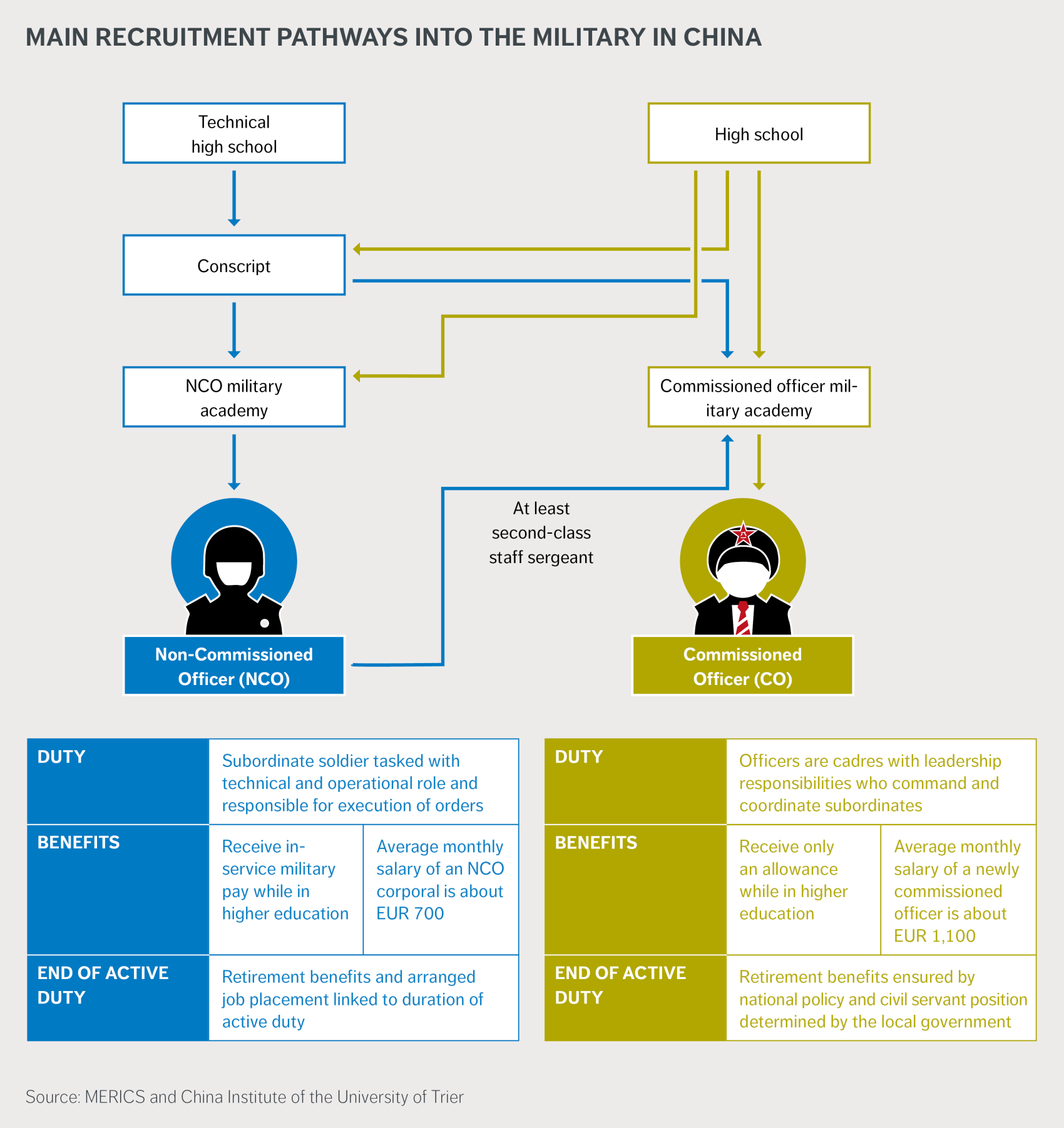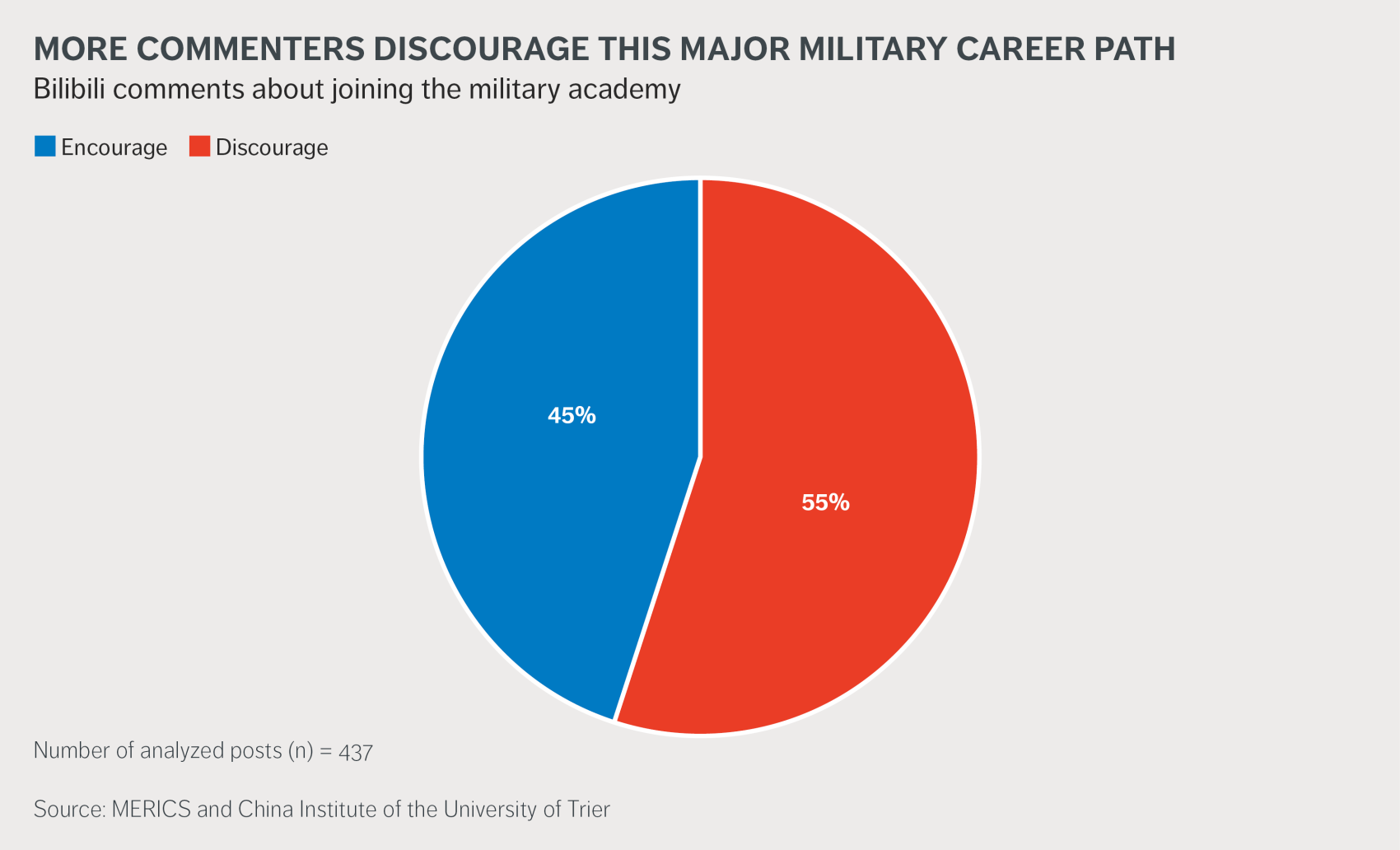

In the army now? Exploring the online debate over a military career in China
Summary:
- Attracting the country’s brightest young talent is key to Xi’s vision of a combat-ready military by 2027. However, pursuing a military career is a divisive issue in China as online comments reveal.
- For those that support a military career, the dominant reason is the financial benefits that come with life in the People’s Liberation Army, especially for military academy graduates who become Commissioned Officers.
- Those arguing against it point to stable alternative career paths, the risk of allocation of highly trained graduates to remote areas and menial tasks and lack of genuine commitment for this position.
- Practical rather than geopolitical or ideological reasons appear to dominate military career considerations. China's economic slowdown, coupled with recent policies designed to instill a sense of patriotism, may shift public attitudes, encouraging more individuals to pursue military service as a career path.
 This analysis is part of “China Spektrum,” a joint research project with the China Institute of the University of Trier (CIUT) funded by the Friedrich Naumann Foundation. As part of this project, we analyze expert and public debates in China. Learn more about the project and find previous publications here.
This analysis is part of “China Spektrum,” a joint research project with the China Institute of the University of Trier (CIUT) funded by the Friedrich Naumann Foundation. As part of this project, we analyze expert and public debates in China. Learn more about the project and find previous publications here.
The People's Liberation Army's call for talent in a changing global landscape
As China approaches the 100th anniversary of the People’s Liberation Army (PLA) in 2027, President Xi Jinping has called for a "combat-ready" military through profound reforms and modernization. This goal may gain urgency and accelerate the Chinese Communist Party's (CCP) demand for military readiness as US President-Elect Donald Trump has signaled a confrontational China policy in his second term.
Attracting the country’s brightest young talent is key to Xi’s vision. However, pursuing a military career is a divisive issue in China. While some view it as a financially stable and patriotic path, others point to systemic issues and uncertain prospects. We explored the reasons for and against joining the PLA by analyzing the comment sections of 29 videos about China's military academies. These feature guidance and insights from retired military officers, personal stories and experiences, educational content, motivational and inspirational material and practical information on the application process.
The PLA has approximately two million active-duty personnel. Each year, it needs around 400,000 new recruits, as about one-third of its active-duty members are conscripts serving two-year terms. The state seeks to ignite ambitions among China’s youth to defend the country. A newly amended National Defense Education Law that took effect in September aims to expand military training of students and pupils and hopefully garner new recruits.
Twelve million students graduated from Chinese universities in June, while October’s urban youth unemployment was at 17.1 percent. With the slowing economy, the share of new graduates favoring state-owned companies, government positions, or public institutions has risen to 73 percent in 2024 from 51 percent in 2019. The number of university students applying to join the military soared to 1,220,000 applicants in 2021, almost six times more than in 2013. The share of university students among new recruits increased to over 80 percent in the first half of 2022, from about 50 percent in 2017.
Apart from entering colleges and universities, high school seniors with the required results from the National College Entrance Exam (Gaokao) can apply to one of China’s 43 military academies, one of the main routes of entry into the military for young people in China. Graduates can enter a military academy for four years to become an officer or a separate school for three years to become a non-commissioned officer (NCO). In 2023, approximately 135,000 students applied to military academies and 17,400 were admitted – an acceptance rate of 12.9 percent. High school graduates who complete their education at a military academy comprise most officers in the PLA.
What is the debate?
Recent years have seen annual online debates about entering the military around the time of the college entrance exam. On the Chinese video platform, Bilibili, former members of the PLA give testimonies about life in the military academy and offer advice to Chinese students. In the comments section, lively commenters express their positions for and against a career in the military.
Financial and job security are key arguments for joining the military
Of the stated advantages of joining the military, people most frequently indicate the substantial financial benefits. They point out that the military provides allowances during studies, and graduates are directly assigned jobs with competitive salaries, starting as platoon leaders earning an equivalent of EUR 790 – 1,050 per month (net) (compared to EUR 395–525 for teachers starting out). As officers rise in rank, earnings can increase significantly, with some mentioning incomes as high as EUR 5,250 per month. They note the coverage of food, accommodation, and clothing, and comprehensive social insurance and medical benefits for personnel and their immediate families. Tuition fees are waived for those accepted into the military academy, relieving families of financial burdens. For those who first enroll in university and then take a leave of absence to serve as conscripts, tuition reductions and severance pay are provided upon completion of service. Retired officers receive substantial allowances, sometimes amounting to an equivalent of tens of thousands or even hundreds of thousands of Euro, ensuring financial security.
Commenters also emphasize the clear path for career advancement and opportunities for social mobility, especially for those from less affluent backgrounds. The military provides a stable employment environment with benefits like housing savings plans and assistance with children's education and elderly care, they note. Building relationships and skills can be valuable assets that give veterans an edge over peers from ordinary universities.
For those seeking structure, the military delivers stability
Stability is frequently cited as a major benefit, with many emphasizing the guarantee of secure employment and opportunities for advancement. This is especially important for those without strong family support or financial resources. Furthermore, the military's commitment to taking care of high-performing personnel is acknowledged. The appeal of belonging to a supportive community and having a "second home" resonates particularly with individuals seeking a stable life and job security.
Call of duty: Patriotism as a motivator
Patriotism is another theme. Some commentors express a strong desire to serve their country and view joining the military as an honorable way to uphold the country’s values and contribute to national defense. They say it is more than a career choice and speak of the pride and honor associated with wearing a military uniform and fulfilling one's duty to the nation.
Overall, these advantages make military service an attractive option for those seeking financial stability, career progression, and a comfortable lifestyle in China, according to these online sentiments.
Most debates focus on arguments “against”
Nevertheless, there is a consensus among the commenters against joining the military. The primary argument is that they can just as easily achieve financial security and social mobility in careers with fewer uncertainties and hardships. Many argue that police academies offer financial support through tuition refunds, student loans, and opportunities for part-time work. As police officers or civil servants, graduates can find stable employment, respectable income, and social status. This may especially appeal to those from disadvantaged backgrounds. A few highlight that police officers often have better work-life balance and are less likely to be assigned to remote areas.
Another suggested path is publicly funded teacher training programs, where tuition fees are waived and students can take loans or work part-time. Upon graduation, they are typically assigned teaching positions, providing immediate employment and financial stability. Civil engineering or computer science are also cited as offering good job prospects and financial aid options.
Concerns over personnel allocation: a reason to reconsider
Many express concerns over job placements from military academies, particularly the risk of being assigned to remote and harsh regions like Xinjiang (新), Tibet (西), or the old Lanzhou (兰) Military Region – areas euphemistically referred to as being sent to "New Zealand" (新西兰) to "pull weeds." The cynical reference to the beloved travel destination New Zealand highlights the frustration of graduates who may face menial tasks. One commenter describes this as “being in a remote workplace where you can’t see anyone, so lonely that it can drive you crazy.” A fate that may even befall high-achieving graduates from prestigious institutions, especially if they lack personal connections within the military. Without strong connections or "background," they say, one might end up in isolated positions with limited opportunities for advancement or personal fulfillment.
Without commitment, military life may not be sustainable
Some also stress that joining the military should stem from a sincere desire to serve the country rather than a need for stable employment or financial benefits. They warn that without true dedication, people may struggle with the demands and sacrifices of military life. Some argue that this wastes valuable resources and could be bad for both recruits and the institution.
Weighing the future of military careers in China
The world is increasingly concerned about a Taiwan or South-China-Sea crisis, yet commentors rarely discuss personal sacrifice of one’s health or life in a potential military conflict or war and are more focused on individual pros and cons when it comes to the choice of a military career. Patriotism is a factor, but with only 12 percent of comments highlighting it as a reason to enlist, patriotism may prove fragile for military academy graduates if conflict erupts.
Overall, more comments discourage military enlistment than support it. Practical considerations dominate, mainly shaped by the material circumstances of those contemplating a military career.
Nevertheless, given China's economic slowdown and the current high level of urban youth unemployment, paired with the party’s efforts to promote patriotism and a secure path to a steady civil service job after discharge, the military may become a more attractive option to high school graduates. This appeal is amplified by the fact that the government considers military and civil service essential for maintaining social order and stability. Beijing may prioritize safeguarding these positions to prevent unrest and ensure societal functioning, making them particularly attractive during the current economic uncertainty and in the face of dwindling opportunities elsewhere.
Methodology
For this analysis the 29 videos with the highest level of viewer engagement related to life in the military (academy) on the video platform Bilibili were selected. Topic modelling was carried out on the comments under these videos that were longer than 21 Chinese characters. 51 topics emerged from the topic modelling, with prominent topics illustrating a clear dichotomous pattern where comments either “encouraged” or “discouraged” people to join the military. After review and removal of redundant content, 12 topics remained, leaving 755 comments. Using OpenAI, each posted comment was tagged with one of the following: “encourages,” “discourages,” or “unclear.” Chat GPT was prompted to give multiple reasons as to why a comment was tagged with "encourages" or "discourages." Manual checking was carried out for accuracy. After the second round of tagging, overlapping reasons under "encourages" and "discourages" were merged. The most prominent reasons for and against military enrollment resulted from the topic modelling are highlighted in this analysis.



